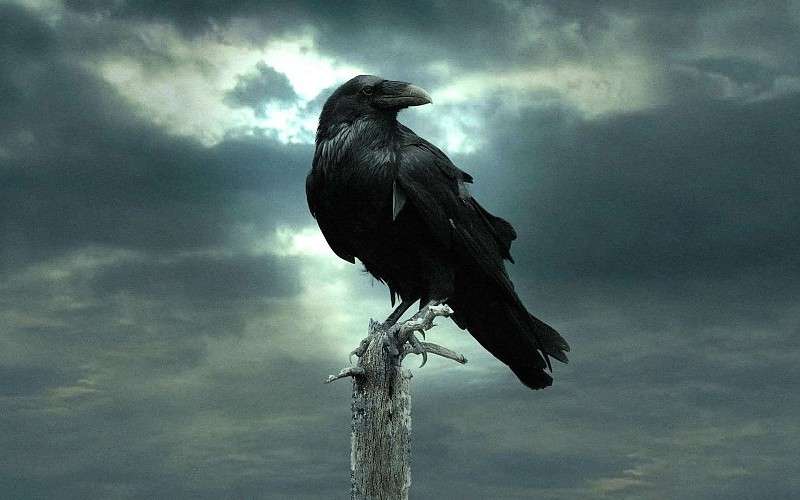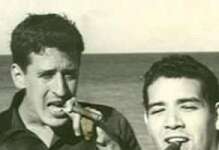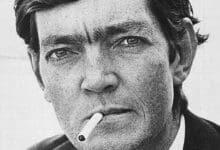El Cuervo de Edgar Allan Poe, traducción de Julio Cortázar
Cortázar y El Cuervo
No fue Cortázar un traductor casual de la obra de Edgar Allan Poe, un profesional al que una editorial encarga un trabajo más. Muy al contrario, Cortázar era un entusiasta del genio estadounidense desde su infancia. La tarea de traducir a Poe, que le llevó nueve meses, la realizó durante unas vacaciones en Italia. Una forma de compaginar placer y trabajo, podría decirse.
Cortázar comenzó a leer a Edgar Allan Poe siendo niño, a los nueve años, en una traducción de Blanco Belmonte. Cortázar recuerda aquella época como algo fascinante y terrible a la vez, pues la lectura de aquellas historias de misterio y terror le provocó terrores nocturnos que no superó hasta bien entrada la adolescencia.
El Cuervo
Una vez, al filo de una lúgubre media noche,
mientras débil y cansado, en tristes reflexiones embebido,
inclinado sobre un viejo y raro libro de olvidada ciencia,
cabeceando, casi dormido,
oyóse de súbito un leve golpe,
como si suavemente tocaran,
tocaran a la puerta de mi cuarto.
“Es —dije musitando— un visitante
tocando quedo a la puerta de mi cuarto.
Eso es todo, y nada más.”
¡Ah! aquel lúcido recuerdo
de un gélido diciembre;
espectros de brasas moribundas
reflejadas en el suelo;
angustia del deseo del nuevo día;
en vano encareciendo a mis libros
dieran tregua a mi dolor.
Dolor por la pérdida de Leonora, la única,
virgen radiante, Leonora por los ángeles llamada.
Aquí ya sin nombre, para siempre.
Y el crujir triste, vago, escalofriante
de la seda de las cortinas rojas
llenábame de fantásticos terrores
jamás antes sentidos. Y ahora aquí, en pie,
acallando el latido de mi corazón,
vuelvo a repetir:
“Es un visitante a la puerta de mi cuarto
queriendo entrar. Algún visitante
que a deshora a mi cuarto quiere entrar.
Eso es todo, y nada más.”
Ahora, mi ánimo cobraba bríos,
y ya sin titubeos:
“Señor —dije— o señora, en verdad vuestro perdón
imploro,
mas el caso es que, adormilado
cuando vinisteis a tocar quedamente,
tan quedo vinisteis a llamar,
a llamar a la puerta de mi cuarto,
que apenas pude creer que os oía.”
Y entonces abrí de par en par la puerta:
Oscuridad, y nada más.
Escrutando hondo en aquella negrura
permanecí largo rato, atónito, temeroso,
dudando, soñando sueños que ningún mortal
se haya atrevido jamás a soñar.
Mas en el silencio insondable la quietud callaba,
y la única palabra ahí proferida
era el balbuceo de un nombre: “¿Leonora?”
Lo pronuncié en un susurro, y el eco
lo devolvió en un murmullo: “¡Leonora!”
Apenas esto fue, y nada más.
Vuelto a mi cuarto, mi alma toda,
toda mi alma abrasándose dentro de mí,
no tardé en oír de nuevo tocar con mayor fuerza.
“Ciertamente —me dije—, ciertamente
algo sucede en la reja de mi ventana.
Dejad, pues, que vea lo que sucede allí,
y así penetrar pueda en el misterio.
Dejad que a mi corazón llegue un momento el silencio,
y así penetrar pueda en el misterio.”
¡Es el viento, y nada más!
De un golpe abrí la puerta,
y con suave batir de alas, entró
un majestuoso cuervo
de los santos días idos.
Sin asomos de reverencia,
ni un instante quedo;
y con aires de gran señor o de gran dama
fue a posarse en el busto de Palas,
sobre el dintel de mi puerta.
Posado, inmóvil, y nada más.
Entonces, este pájaro de ébano
cambió mis tristes fantasías en una sonrisa
con el grave y severo decoro
del aspecto de que se revestía.
“Aun con tu cresta cercenada y mocha —le dije—,
no serás un cobarde,
hórrido cuervo vetusto y amenazador.
Evadido de la ribera nocturna.
¡Dime cuál es tu nombre en la ribera de la Noche Plutónica!”
Y el Cuervo dijo: “Nunca más.”
Cuánto me asombró que pájaro tan desgarbado
pudiera hablar tan claramente;
aunque poco significaba su respuesta.
Poco pertinente era. Pues no podemos
sino concordar en que ningún ser humano
ha sido antes bendecido con la visión de un pájaro
posado sobre el dintel de su puerta,
pájaro o bestia, posado en el busto esculpido
de Palas en el dintel de su puerta
con semejante nombre: “Nunca más.”
Mas el Cuervo, posado solitario en el sereno busto.
Las palabras pronuncio, como vertiendo
su alma sólo en esas palabras.
Nada más dijo entonces;
no movió ni una pluma.
Y entonces yo me dije, apenas murmurando:
“Otros amigos se han ido antes;
mañana él también me dejará,
como me abandonaron mis esperanzas.”
Y entonces dijo el pájaro: “Nunca más.”
Sobrecogido al romper el silencio
tan idóneas palabras,
“sin duda —pensé—, sin duda lo que dice
es todo lo que sabe, su solo repertorio, aprendido
de un amo infortunado a quien desastre impío
persiguió, acosó sin dar tregua
hasta que su cantinela sólo tuvo un sentido,
hasta que las endechas de su esperanza
llevaron sólo esa carga melancólica
de ‘Nunca, nunca más’.”
Mas el Cuervo arrancó todavía
de mis tristes fantasías una sonrisa;
acerqué un mullido asiento
frente al pájaro, el busto y la puerta;
y entonces, hundiéndome en el terciopelo,
empecé a enlazar una fantasía con otra,
pensando en lo que este ominoso pájaro de antaño,
lo que este torvo, desgarbado, hórrido,
flaco y ominoso pájaro de antaño
quería decir graznando: “Nunca más.”
En esto cavilaba, sentado, sin pronunciar palabra,
frente al ave cuyos ojos, como-tizones encendidos,
quemaban hasta el fondo de mi pecho.
Esto y más, sentado, adivinaba,
con la cabeza reclinada
en el aterciopelado forro del cojín
acariciado por la luz de la lámpara;
en el forro de terciopelo violeta
acariciado por la luz de la lámpara
¡que ella no oprimiría, ¡ay!, nunca más!
Entonces me pareció que el aire
se tornaba más denso, perfumado
por invisible incensario mecido por serafines
cuyas pisadas tintineaban en el piso alfombrado.
“¡Miserable —dije—, tu Dios te ha concedido,
por estos ángeles te ha otorgado una tregua,
tregua de nepente de tus recuerdos de Leonora!
¡Apura, oh, apura este dulce nepente
y olvida a tu ausente Leonora!”
Y el Cuervo dijo: “Nunca más.”
“¡Profeta!” —exclamé—, ¡cosa diabólica!
¡Profeta, sí, seas pájaro o demonio
enviado por el Tentador, o arrojado
por la tempestad a este refugio desolado e impávido,
a esta desértica tierra encantada,
a este hogar hechizado por el horror!
Profeta, dime, en verdad te lo imploro,
¿hay, dime, hay bálsamo en Galaad?
¡Dime, dime, te imploro!”
Y el cuervo dijo: “Nunca más.”
“¡Profeta! —exclamé—, ¡cosa diabólica!
¡Profeta, sí, seas pájaro o demonio!
¡Por ese cielo que se curva sobre nuestras cabezas,
ese Dios que adoramos tú y yo,
dile a esta alma abrumada de penas si en el remoto Edén
tendrá en sus brazos a una santa doncella
llamada por los ángeles Leonora,
tendrá en sus brazos a una rara y radiante virgen
llamada por los ángeles Leonora!”
Y el cuervo dijo: “Nunca más.”
“¡Sea esa palabra nuestra señal de partida
pájaro o espíritu maligno! —le grité presuntuoso.
¡Vuelve a la tempestad, a la ribera de la Noche Plutónica.
No dejes pluma negra alguna, prenda de la mentira
que profirió tu espíritu!
Deja mi soledad intacta.
Abandona el busto del dintel de mi puerta.
Aparta tu pico de mi corazón
y tu figura del dintel de mi puerta.
Y el Cuervo dijo: “Nunca más.”
Y el Cuervo nunca emprendió el vuelo.
Aún sigue posado, aún sigue posado
en el pálido busto de Palas.
en el dintel de la puerta de mi cuarto.
Y sus ojos tienen la apariencia
de los de un demonio que está soñando.
Y la luz de la lámpara que sobre él se derrama
tiende en el suelo su sombra. Y mi alma,
del fondo de esa sombra que flota sobre el suelo,
no podrá liberarse. ¡Nunca más!
The Raven
By Edgar Allan Poe
Once upon a midnight dreary, while I pondered, weak and weary,
Over many a quaint and curious volume of forgotten lore—
While I nodded, nearly napping, suddenly there came a tapping,
As of some one gently rapping, rapping at my chamber door.
“’Tis some visitor,” I muttered, “tapping at my chamber door—
Only this and nothing more.”
Ah, distinctly I remember it was in the bleak December;
And each separate dying ember wrought its ghost upon the floor.
Eagerly I wished the morrow;—vainly I had sought to borrow
From my books surcease of sorrow—sorrow for the lost Lenore—
For the rare and radiant maiden whom the angels name Lenore—
Nameless here for evermore.
And the silken, sad, uncertain rustling of each purple curtain
Thrilled me—filled me with fantastic terrors never felt before;
So that now, to still the beating of my heart, I stood repeating
“’Tis some visitor entreating entrance at my chamber door—
Some late visitor entreating entrance at my chamber door;—
This it is and nothing more.”
Presently my soul grew stronger; hesitating then no longer,
“Sir,” said I, “or Madam, truly your forgiveness I implore;
But the fact is I was napping, and so gently you came rapping,
And so faintly you came tapping, tapping at my chamber door,
That I scarce was sure I heard you”—here I opened wide the door;—
Darkness there and nothing more.
Deep into that darkness peering, long I stood there wondering, fearing,
Doubting, dreaming dreams no mortal ever dared to dream before;
But the silence was unbroken, and the stillness gave no token,
And the only word there spoken was the whispered word, “Lenore?”
This I whispered, and an echo murmured back the word, “Lenore!”—
Merely this and nothing more.
Back into the chamber turning, all my soul within me burning,
Soon again I heard a tapping somewhat louder than before.
“Surely,” said I, “surely that is something at my window lattice;
Let me see, then, what thereat is, and this mystery explore—
Let my heart be still a moment and this mystery explore;—
’Tis the wind and nothing more!”
Open here I flung the shutter, when, with many a flirt and flutter,
In there stepped a stately Raven of the saintly days of yore;
Not the least obeisance made he; not a minute stopped or stayed he;
But, with mien of lord or lady, perched above my chamber door—
Perched upon a bust of Pallas just above my chamber door—
Perched, and sat, and nothing more.
Then this ebony bird beguiling my sad fancy into smiling,
By the grave and stern decorum of the countenance it wore,
“Though thy crest be shorn and shaven, thou,” I said, “art sure no craven,
Ghastly grim and ancient Raven wandering from the Nightly shore—
Tell me what thy lordly name is on the Night’s Plutonian shore!”
Quoth the Raven “Nevermore.”
Much I marvelled this ungainly fowl to hear discourse so plainly,
Though its answer little meaning—little relevancy bore;
For we cannot help agreeing that no living human being
Ever yet was blessed with seeing bird above his chamber door—
Bird or beast upon the sculptured bust above his chamber door,
With such name as “Nevermore.”
But the Raven, sitting lonely on the placid bust, spoke only
That one word, as if his soul in that one word he did outpour.
Nothing farther then he uttered—not a feather then he fluttered—
Till I scarcely more than muttered “Other friends have flown before—
On the morrow he will leave me, as my Hopes have flown before.”
Then the bird said “Nevermore.”
Startled at the stillness broken by reply so aptly spoken,
“Doubtless,” said I, “what it utters is its only stock and store
Caught from some unhappy master whom unmerciful Disaster
Followed fast and followed faster till his songs one burden bore—
Till the dirges of his Hope that melancholy burden bore
Of ‘Never—nevermore’.”
But the Raven still beguiling all my fancy into smiling,
Straight I wheeled a cushioned seat in front of bird, and bust and door;
Then, upon the velvet sinking, I betook myself to linking
Fancy unto fancy, thinking what this ominous bird of yore—
What this grim, ungainly, ghastly, gaunt, and ominous bird of yore
Meant in croaking “Nevermore.”
This I sat engaged in guessing, but no syllable expressing
To the fowl whose fiery eyes now burned into my bosom’s core;
This and more I sat divining, with my head at ease reclining
On the cushion’s velvet lining that the lamp-light gloated o’er,
But whose velvet-violet lining with the lamp-light gloating o’er,
She shall press, ah, nevermore!
Then, methought, the air grew denser, perfumed from an unseen censer
Swung by Seraphim whose foot-falls tinkled on the tufted floor.
“Wretch,” I cried, “thy God hath lent thee—by these angels he hath sent thee
Respite—respite and nepenthe from thy memories of Lenore;
Quaff, oh quaff this kind nepenthe and forget this lost Lenore!”
Quoth the Raven “Nevermore.”
“Prophet!” said I, “thing of evil!—prophet still, if bird or devil!—
Whether Tempter sent, or whether tempest tossed thee here ashore,
Desolate yet all undaunted, on this desert land enchanted—
On this home by Horror haunted—tell me truly, I implore—
Is there—is there balm in Gilead?—tell me—tell me, I implore!”
Quoth the Raven “Nevermore.”
“Prophet!” said I, “thing of evil!—prophet still, if bird or devil!
By that Heaven that bends above us—by that God we both adore—
Tell this soul with sorrow laden if, within the distant Aidenn,
It shall clasp a sainted maiden whom the angels name Lenore—
Clasp a rare and radiant maiden whom the angels name Lenore.”
Quoth the Raven “Nevermore.”
“Be that word our sign of parting, bird or fiend!” I shrieked, upstarting—
“Get thee back into the tempest and the Night’s Plutonian shore!
Leave no black plume as a token of that lie thy soul hath spoken!
Leave my loneliness unbroken!—quit the bust above my door!
Take thy beak from out my heart, and take thy form from off my door!”
Quoth the Raven “Nevermore.”
And the Raven, never flitting, still is sitting, still is sitting
On the pallid bust of Pallas just above my chamber door;
And his eyes have all the seeming of a demon’s that is dreaming,
And the lamp-light o’er him streaming throws his shadow on the floor;
And my soul from out that shadow that lies floating on the floor
Shall be lifted—nevermore!
Lee también
Germen, un poema de Liza Rosas Bustos
Correr es bueno especialmente si quien nos persigue es malo
El minotauro fascista de San Fabián de Alico, por Jorge Muzam



